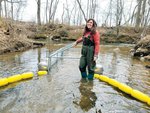


PITTSBORO — When Pittsboro resident and Clean Haw River co-founder Katie Bryant founded the initiative in 2020, she made it her mission to advocate for action against industries discharging dangerous chemicals, including PFAS, into the Haw River, Pittsboro’s main source of water.
Naturally, she felt thrilled when the town’s board of commissioners voted unanimously to sue the manufacturers responsible for the creation and discharge of PFAS.
“It was a relief,” Bryant said. “Because it’s exhausting trying to get people to do what they need to do and just constantly hitting roadblocks, constantly wanting to give up. But I knew in the background, things were slowly happening … so I’m excited.”
Pittsboro commissioners voted in July to engage Sher Edling LLP, a California-based firm with extensive experience in environmental-related legal processes, to investigate potential sources of PFAS discharges upstream. Commissioners followed up two weeks ago by voting unanimously to sue PFAS manufacturers, becoming the first municipal government in North Carolina to pursue legal action against PFAS producers.
Activists like Bryant have advocated — through demonstrations, presentations to the board and other municipalities and more — for Pittsboro to take action against those responsible for the generations of pollution caused by PFAS.
Bryant and her fellow co-founder, Dr. Jessica Merricks, started Clean Haw River in 2020 to advocate for clean water for Pittsboro, a problem that’s plagued the town for years. Both Bryant and Merricks are Pittsboro residents, so they’ve also been victims of the polluted waterways and water supply.
“My family’s been overexposed,” Bryant said. “My husband needs more monitoring than the average person in the United States, and my children are there as well.”
PFAS, per- and polyfluoroalkyl chemicals, are considered likely human carcinogens and consistently found in raw water samples from the Haw, which is Pittsboro’s source of drinking water.
PFAS may also be linked to increased cholesterol levels, decreased vaccine response in children, changes in liver enzymes, increased risk of high blood pressure or preeclampsia in pregnant women, decreases in infant birth weights, and an “increased risk for kidney and testicular cancer,” according to the Agency for Toxic Substances and Disease Registry.
Merricks — a biology professor at Elon University — said Pittsboro’s decision to pursue litigation against PFAS manufacturers was “a long time coming.” While she’s only lived in Pittsboro since 2019, she’s monitored her home’s water and installed an under-the-sink filter as a safeguard.
“We had been in our house just a few months when that vague letter came through the mail, about the water, and we sprung into action as quickly as we could,” Merricks said. “We’ve just been dealing with the financial burden of it.”
Merricks said she was glad the town decided to pursue litigation, but it doesn’t necessarily make up for years residents had been consuming the likely human carcinogens.
“It’s been terribly inconvenient, stressful, annoying and a completely unnecessary amount of stress on us to have to deal with it,” she said.
Bryant and Merricks also worked with the town to come up with recommendations for solutions to the water crisis through their appointments to the Pittsboro Water Quality Task Force. Bryant also was the person who recommended the law firm — Sher Edling LLP — pursuing the litigation against PFAS manufacturers on the town’s behalf.
“I had to take a big step back and not overdo it and push and yell and scream and kick and fight,” Bryant said. “They have definitely slowly made their way — like a sloth — towards this moment, but I’m happy I’m so happy that they finally did.”
Clean Haw River wasn’t the only organization fighting for clean water for Pittsboro residents. The Haw River Assembly, created in 1982, advocates for clean water along both the Haw River and the Jordan Lake watershed.
Haw River Riverkeeper Emily Sutton has been with the Haw River Assembly since 2016 and served with Merricks and Bryant on the Pittsboro Water Quality Task Force. When she heard about the board’s vote to sue PFAS producers, her first reaction was relief.
Still, Sutton said she still felt action could’ve come sooner.
“We’ve been trying to get the town of Pittsboro to take meaningful action on this issue for six years, and we have presented at countless town council meetings and county commissioners meetings trying to get the town of Pittsboro to protect the members of their community,” she said.
The Haw River Assembly filed multiple class-action lawsuits against municipalities, including Greensboro and Burlington, for the role their water treatment plants played in discharges of chemicals such as PFAS and 1,4-Dioxane.
Sutton said when she read through the contents of Pittsboro’s 51-page lawsuit, however, she was concerned with the approach the law firm appears to be taking.
“Their goal is to go after the manufacturers of these chemicals themselves, rather than the industries who are responsible for polluting their drinking water supply,” Sutton said. “We’re talking about DuPont and Chemours and all of these large corporations who think this is very small issue.”
While the approach is different than what the Haw River Assembly is doing in its litigation, Sutton said there is the potential for the Pittsboro suit to bring forth actual change.
“Now I do think that there’s a meaningful strategy here, and I hope that other municipalities take a similar route,” she said. “If these compounds can be removed from manufacturing processes as a whole, then that protects communities throughout the globe.”
The Haw River Assembly is still working to hold industries responsible for the discharges accountable, and she said she will continue to urge Pittsboro to take action against the polluters as well as manufacturers.
“We’ve been able to identify the sources of pollution within the cities,” Sutton said. “But these industries who have just dumped toxins into our surface water for decades need to be held accountable by the people that they’re poisoning.”
Merricks said she and Bryant are also working to campaign for further legislation at the state level to address the possibility of regulating PFAS, along with other unregulated substances.
“Every term we end up with a handful of bills related to PFAS, and none of them make it to a vote,” Merricks said. “I think we’re very much focused on supporting those representatives who have the citizens’ best interests at heart and trying to advocate for those people to get in office or stay in office — that’s important to us.”
Clean Haw River is also in the process of pursuing its own class action lawsuit against polluters and PFAS manufacturers, according to Bryant. She said while Clean Haw River is in the beginning stages of planning this undertaking, she and Merricks want to extend their activism beyond Chatham County’s borders to neighboring communities, including Sanford.
For now, though, Bryant said she’s optimistic in the direction her town is going in fighting for clean water for its residents.
“This lawsuit is the stepping point — it’s the beginning of the end of this pollution,” Bryant said. “Pittsboro has made a giant step … It’s the beginning of the end of a really terrible time. I hope this even makes more major changes in the U.S. and our state.”
Reporter Taylor Heeden can be reached at theeden@chathamnr.com.